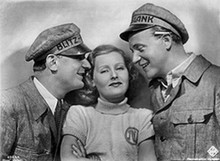 Loading... Please wait...
Loading... Please wait...New Products
Our Newsletter
Product Description
A Blonde's Dream (1932)
Director:
Paul MartinWriters:
Walter Reisch, Billy WilderStars:
Lilian Harvey, Willy Fritsch, Willi ForstWhile the politics of this movie certainly reflect the time, the script by Reisch and Wilder has a lot in it that goes beyond the usual Weimar/National Socialist transition films.
Forst is great as a self-involved cad who competes with his best friend Fritsch for the affection of Harvey's Jou-Jou (a showbiz wannabe whose last dime has been conned from her by a smooth-talker claiming to be a Hollywood big shot) The clever double entendre that one expects from Wilder is in the script as are some terrifically shot musical numbers.
One of the most innovative is a dream sequence that follows a train out of the city of Berlin under the Atlantic Ocean to NYC and across to Hollywood. The simplicity of a makeshift home in a boxcar is lampooned by a catchy number called "We Don't Pay Rent Anymore", and resonates for the Depression era. Then there is a wistful Lilian Harvey standard called "Somewhere on Earth" that also reflects the yearning for security and happiness that were prevalent during that globally unstable time.
All in all, this is a witty and enjoyable ribbing of hard times, big aspirations and love. The cast plays it to the hilt with remarkable chemistry from Forst, Fritsch and Hoerbiger. And, as she mostly always was, Lilian Harvey proves herself charming, lovely and one of the most compelling of the 30's film stars.
Forst is great as a self-involved cad who competes with his best friend Fritsch for the affection of Harvey's Jou-Jou (a showbiz wannabe whose last dime has been conned from her by a smooth-talker claiming to be a Hollywood big shot) The clever double entendre that one expects from Wilder is in the script as are some terrifically shot musical numbers.
One of the most innovative is a dream sequence that follows a train out of the city of Berlin under the Atlantic Ocean to NYC and across to Hollywood. The simplicity of a makeshift home in a boxcar is lampooned by a catchy number called "We Don't Pay Rent Anymore", and resonates for the Depression era. Then there is a wistful Lilian Harvey standard called "Somewhere on Earth" that also reflects the yearning for security and happiness that were prevalent during that globally unstable time.
All in all, this is a witty and enjoyable ribbing of hard times, big aspirations and love. The cast plays it to the hilt with remarkable chemistry from Forst, Fritsch and Hoerbiger. And, as she mostly always was, Lilian Harvey proves herself charming, lovely and one of the most compelling of the 30's film stars.
Currency Converter
Choose a currency below to display product prices in the selected currency.

















